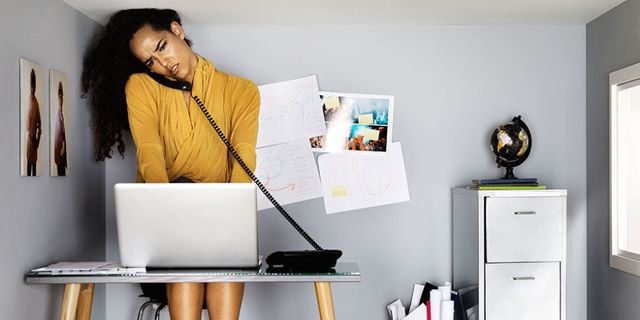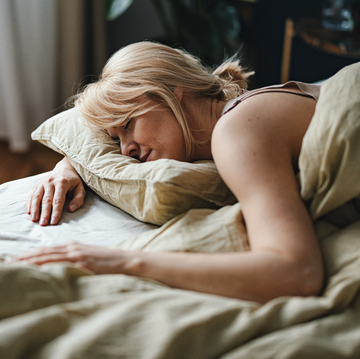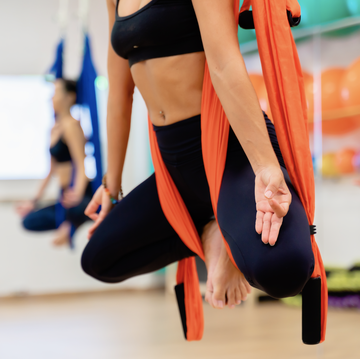1. Adjust your screen
When you think of being healthier, your first thought might not be about your sight – but when you're staring at a screen for 8+ hours a day, it's easy for your eyes to get damaged. It's obviously impossible to avoid smartphones, computers and tablets altogether, but you can minimise the impact as much as possible with little tweaks, like increasing font sizes so you don't squint, reducing the brightness and holding all screens directly in front of your face so you're not awkwardly kinking your neck. Many workplaces offer subsidised (or in some cases even free) eye tests too, so make sure you take advantage.
2. Sort out your chair
Fixing your posture is one of the simplest ways to improve your in-office health. If it's a realistic option, you could try a standing desk, or replacing your seat with an exercise ball to prevent you from hunching over all day. However, if you're in the 99% of offices that only offer a bog-standard spinny number (excellent for chair-racing, not so great for your back), at least make sure it's set up for you. Comfortable seating varies from person to person, but at the very least, your feet should be flat on the floor when you sit, the back height should be adjusted to support your body, and your elbows should be around the same height as your workstation.
3. Invest in a jug
Or a nice fancy glass bottle. Basically anything that holds two litres of water. And drink it. All. Staying hydrated is great for everything from your organs to your concentration levels – but if you need further convincing, here's what loading up on H2O can do for your skin. Some people advise using smaller cups, as this means you'll have to get up more often to refill them, but it also makes it difficult to track how much you've actually consumed – and lots of people simply don't have 8+ breaks a day to fill up a glass, meaning that they actually end up drinking even less. Of course, stretching your legs is still important – which brings us to…
4. Setting a timer
Whether it's an alert in your Outlook calendar or an alarm on your phone, find a way to remind yourself to get up at regular intervals throughout the day. Stand while you talk on the phone, read printed out reports while pacing the office, anything to get off your bum for a minute. Experts recommend moving around every 30 minutes, but if that's not realistic with your workload, do it at least every hour, and try to go for a walk at lunch to balance things out. Use the time to do the tea round, stroll to a colleague's desk and ask them that question you were going to email about, go for the wee you've been desperately needing for the last hour (come on, we all do it) or if you're really lucky, go outside – a break from your screen could be just what you need for a genius idea to strike.
5. Rethink your snacks
Unless you've got a tiny appetite, you're probably going to succumb to snack time at work. Health-wise, this can either be great or disastrous, depending on what you choose. Filling your work drawer with nuts, dried fruit, or *genuinely* healthy cereal bars (read the labels: Nakd bars, for instance, are ideal, Coco Pops bars, not so much). Snacks like this mean you'll a) never go hungry, and b) always have a nutritious alternative to that epic slice of chocolate birthday cake you seem to be offered at least once a week (seriously, how can someone be turning 30 every Wednesday?!).
6. Rest your wrists
Your wrists are one of the few parts of you that is constantly moving at your desk – and that's why it's so important to give them proper support. In addition to adjusting your seat and desk properly (see item 2), if you often find your wrists feeling sore or achy, you might want to consider a getting a wrist rest, which is essentially a strip of padded foam or gel that cushions your wrists and helps to prevent common frequent-typer conditions like carpal tunnel syndrome or repetitive strain injury. Ask the company to invest in one for you - you can find a good quality option online for around £15. And even if you have to shell out yourself, it's a small price to pay for strong, healthy joints.
7. Get a plant
Not just cos they're pretty. Studies have shown that having a pot plant on your desk can help to reduce fatigue and cuts symptoms of everything from headaches to coughs and sore throats. It's not known for sure whether the effect is physical (fresh oxygen is good for you) or psychological (looking at nature boosts your mood), but workplaces with a good supply of foliage tend to have lower rates of sick leave and stress – and their presence makes people more productive too! If your office won't supply them, Ikea have a good range starting from around £2. Just remember to water it as regularly – they hate being dehydrated just as much as you do!
8. Clean up daily
We don't mean shuffling that mountainous stack of papers into a sort-of pile at the end of the day – we mean getting a pack of anti-bacterial wipes and giving everything a thorough wipe down. It's an extra chore to add to your never-ending to-do list, but keyboards, computer mice and desk phones are amongst the top 10 germiest places in the average office, and they're breeding grounds for coughs, colds and all of those other niggly illnesses that always seem to be 'doing the rounds'. Just think how often you breathe on your handset every day, or eat a snack over your keyboard and get crumbs everywhere. Studies show your desk is filthy. Crack out the Dettol and sort it out.
9. Moisturise
Offices tend to be blasted with thick, stuffy heating in the winter, and overpowering air con in the summer – both of which can wreck havoc with even the most robust of skins. Keep a tube of hand cream within eyesight on your desk to remind you to use it frequently, and stash a facial mist in your drawer (or even better, the office fridge) – not only will it freshen up your make up, it'll make your skin look brighter and more hydrated, giving you the closest thing to a dewy, holiday-esque glow possible (outside of an actual tropical getaway.













